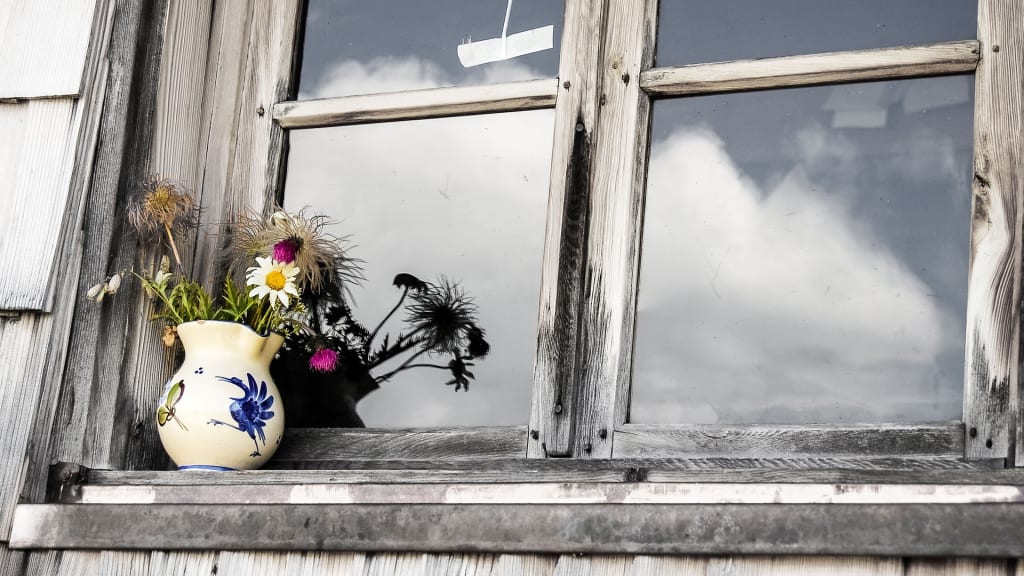
In middle school, her class was assigned to write about a family heirloom, but her mom said they didn’t have any.
“We left everything behind. Refugees have memories.”
She didn’t feel like reading out loud to her class about the trauma that gets passed down from generation to generation, so she wrote about a necklace that her grandma gave her. Even if it was store-bought, it was tangible. Her grandma had placed it in the palm of her hands. She relied on the necklace’s positive energy on days she was feeling down. And after her grandma passed away, she wore it when she wanted to feel her grandma’s presence watching over her.
She was wearing the necklace today for good luck as she stood on the farm where her grandparents first lived after leaving the refugee camps. The farm owners greeted her and they exchanged niceties before showing her to the one bedroom farmhouse where her grandparents and other family had stayed. She requested time alone to connect with the spirit of the room and tap into the past. She told them she was a writer and needed to soak up the space, the way Lin Manuel-Miranda stayed in a historic hotel when he wrote Hamilton. Only instead of a hip hop musical, she was writing a memoir about her grandparents’ immigrant experience in Iowa.
Standing at the door, she scanned the room, imagining a roomful of people going about their day. Checking the windows, again, she saw that the owners weren't peeking, so she started tapping the floorboards with the toe of her shoe. Walking to the bed, she lifted the mattress, because she had to check there, of course. Still anxious that the owners were lingering nearby, she dropped the mattress gently, releasing a cloud of dust into the air. They can’t know that she was looking for the lost bag of gold bars her grandmother left behind.
Decades ago, her mother’s family escaped on fishing boats from South Vietnam’s shores across choppy international waters. The night they left their home, her mom said she would never forget the look on her grandfather’s face as he watched his briefcase sink into the deep. An auntie had miscalculated when she threw it from one boat to another. It contained their most valuable belongings - papers and gold. Fortunately, though, her grandma had prepared. She held a small bag of gold in the palms of her hands. Grandma had learned over the years never to put all her eggs in one basket. Women of her generation had many children for the same reason: in case one died. A matriarch was used to carrying around extra weight for her family.
Decades later, her Grandma's granddaughter was driving to Iowa to retrace parts of their journey. She wanted to learn where she came from. At her grandmother’s funeral, her aunties reminisced and told stories of grandma’s stubbornness. Her mother rarely talked about the early days in the states, so she hung around her aunties to hear the juicy stories. It was then that she learned about the gold that was stashed away and never recovered.
It was nearby, too, a few hours drive. She simply had to claim it for her family. For herself. She had asked her mother about it.
“Why didn’t you or aunties ever go back to get it?”
“The past is the past. I don’t want to dig it up.”
“Couldn’t they have used that gold to start their lives here? It’s so much money.”
“Your grandparents didn’t go back for it. I respected their decision.
“Why didn’t grandpa go back for it?”
“It wasn’t worth it. Who wants to be reminded of that time.”
“Aren’t you curious if the gold is still there, Mom? Do you want to go with me?”
“The past is the past. There’s golden kiwi in the kitchen if you want some."
Her mom turned to watch the Vietnamese-dubbed Korean drama. She was always amazed by how her mother neatly tucked the past into a tiny pocket, and put it away.
She didn’t have anything to lose, so she dug around and found the farm owners’ contact. She had wondered if they were still living there after all these years. She almost couldn’t believe it when they answered the phone. What a luxury to stay put.
The farm owners had sponsored her grandparents’ family, and given them a single bedroom place behind the owners’ house. Her grandfather had told her grandmother to hide their gold because the owners were suspicious of them. They stayed rent-free in exchange for unpaid labor. Her family tended to chickens and other livestock on their sponsors’ land. Even her aunties didn’t say much about their time on the farm, and hearing these stories made her feel unsettled.
When grandpa could finally afford their own apartment, they left without notice in the middle of the night. If they avoided the owners, they wouldn’t need to explain or risk offending them. Also, they were used to disappearing into the dark. In their rush, they left the gold behind.
They couldn’t return. With limited English and no power, the risk was greater than the reward. They needed to move on, again. That was a refugee’s strength, after all, the willingness to let go and start over. If a people carried their roots around, they could plant themselves fresh into any earth.
Watching the dust particles float in the air, an idea jolted through her and she sat upright. To her grandma, nothing was where it was supposed to be. Everything could be moved. She coaxed the cold metal bed frame to slide soundlessly, and cleared away the layer of dust settled on the floor. She held her breath and pounded the floorboard lightly with the side of her fist. She cocked her head and moved her face a little closer to the ground.
A board lifted ever so slightly. No way. She tapped again and caught the board with a fingernail. She looked up instinctively at the windows, and saw only the land and sky. No prying eyes. Taking a deep breath, she pried the board higher. It gave easily.
Peering into the narrow hole, she was surprised to find the delicate bag slouched over, resigned to be forgotten. She grasped her necklace and silently thanked her grandma for putting it somewhere easy to access as long as you didn’t mind messing up the floor plan.
Reaching in, she lifted the bag. The material sagged from the weight of the gold bars, but stretched around a large object near the opening. It took a strange shape, like a child playing hide and seek behind a slender tree trunk.
Pulling at the pouch, she revealed a little black book sitting atop the gold. Her eyes narrowed as she inspected it. She had only ever heard about the gold. Grabbing the book, she tossed the pouch into her purse and tracked it as it fell to the bottom of her bag. She sighed with relief.
Opening the smooth, bound book the first thing she noticed was the handwriting. The scrawl of the letters. The lines and hooks looked familiar. Distinctly Vietnamese. It’s full of names. Cities and locations. Dates. Did her grandparents know these people? Fanning the pages with her thumbs, she saw nothing but names. Name after name after name.
Actually, only men’s names. Could it be a book naming other military spies? Her grandfather was a spy for the army. Maybe he was the keeper of some secret list, like a database. She doesn’t even know what questions to ask. It’s time to call her mom, but not here.
After thanking the owners for the stroll down memory lane, she made her way to her car in the glow of the sunset and drove to the nearest parking lot. In her broken Vietnamese, she told her mom that she found the gold and a small black book.
“It’s our family tree,” her mom said plainly. “Every family kept one.”
“How come you never told me about it?”
“We left it. Those books are big. Grandpa must have tried to recreate it.”
“But the record only contains men. Why is it just the patriarchal line?”
“In Vietnam, that’s the way it was.”
She wondered what her grandmother would have said if she had returned it when she was alive. Did her grandma regret leaving their gold behind all these years? But then she could hear her grandma saying “the past was the past,” just as her mom always said. Funny how her mother picked this up from her grandmother. What really gets passed down?
After Iowa, her family had moved on from the flat farmland to the many sky lines and landscapes of different cities. They made more money. Started new lives. Recreated history. Her real inheritance wasn’t an object. It was knowing that as long as you have each other, you could do it again.
She drove to her parents’ house a few weeks later, excited to return the gold to her mom. Sitting next to her mom on the couch, she extended her arms to present the bag with both hands, a sign of respect.
“Thank you, con (daughter).”
“I had it appraised. The estimated value is $20,000. I can’t believe it. What are you going to do?”
“I’ll divide it evenly with the sisters.”
“And what do you want to do with the book, Mom?”
“You can hold on to it.”
“Flipping through the pages, I’ve learned where our family used to live. There’s so much history here. Do you want to read it? It’s so interesting to see where we came from. ”
“I came from your grandmother. You came from me.”
Looking at her mother, her breath slowed, the way a person’s breathing pauses in anticipation of good news. She’d missed it, not expecting to find it here in front of her. She was looking at what we pass on.
***
About the Creator
Thi Nguyen (she/her)
Writing to understand. I'm a mother, daughter, sister, spouse. I'm a scientist, educator, mentor, and community advocate.






Comments
There are no comments for this story
Be the first to respond and start the conversation.